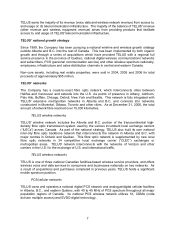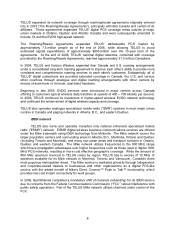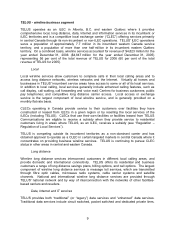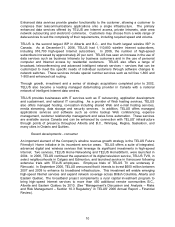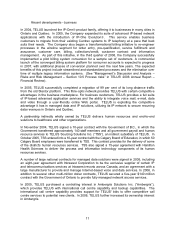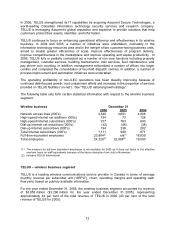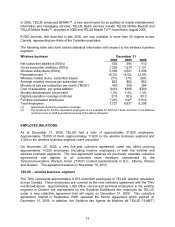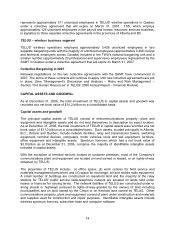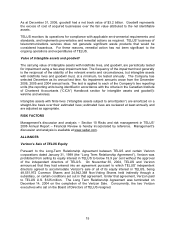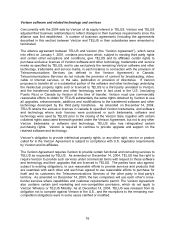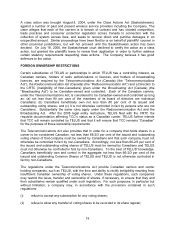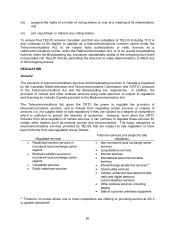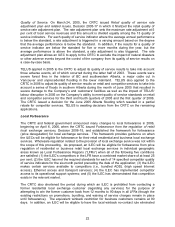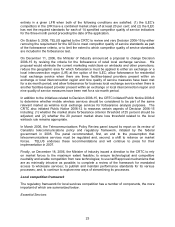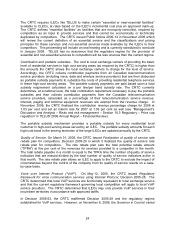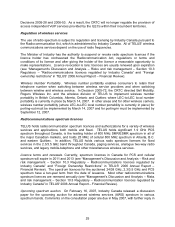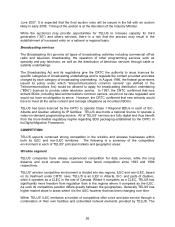Telus 2006 Annual Report Download - page 18
Download and view the complete annual report
Please find page 18 of the 2006 Telus annual report below. You can navigate through the pages in the report by either clicking on the pages listed below, or by using the keyword search tool below to find specific information within the annual report.The Verizon Agreement applies to Verizon and its American and Canadian affiliates, but
specifically excludes Verizon Wireless. Independent of the Verizon Agreement, TELUS Mobility
and Verizon Wireless negotiated and implemented mutually beneficial changes to their
reciprocal roaming arrangements. On November 29, 2004, TELUS Mobility and Verizon
Wireless expanded their roaming agreements under a consolidated long-term roaming
agreement to improve each other’s ability to provide more consistent and comprehensive
Canada and U.S. roaming services to each other’s customers.
The initial term of the Verizon Agreement was for one year ending December 31, 2001. Prior to
the amendment made on December 14, 2004, the term was renewable annually for successive
one-year periods at TELUS’ sole discretion with a last renewal right for a term ending
December 31, 2008. TELUS had renewed the Verizon Agreement each year, and as at
December 14, 2004, the term of the agreement was further extended to December 31, 2008. In
most instances, TELUS will have a right to use the licensed software and technology on a non-
exclusive basis following the expiry or other termination of the agreement.
The Verizon Agreement provides for the following annual payments to be made by TELUS
(including both licence purchase prices and fees to be paid for all other property rights and
services provided or granted to TELUS under the Verizon Agreement): U.S. $155 million during
the initial term (2001), U.S. $100 million in the first renewal term (2002), U.S. $20 million in 2003
and in each subsequent annual renewal term up to December 31, 2008. As amended on
December 14, 2004, annual payments in the aggregate of U.S. $82 million for the years 2005 to
2008 were reduced to an aggregate nominal amount of only four U.S. dollars for that time
period.
Directory Business
In 2001, TELUS sold its directory advertising services business to Verizon Information Services
– Canada Inc. (“VIS”), a subsidiary of Verizon. At the same time, various TELUS subsidiaries
and VIS entered into a series of commercial arrangements whereby VIS acquired the exclusive
right to publish TELUS directories and provide on-line directories on TELUS portals, in Canada
and within 40 miles of the Canada-U.S. border, for an initial term of 30 years with certain
renewal rights thereafter, and TELUS agreed not to compete with this business for the term of
the agreement.
On November 9, 2004, Verizon announced that it had completed a transaction to sell VIS to
Advertising Directory Solutions Holdings Inc. (“ADSHI”), an affiliate of Bain Capital. On May 25,
2005, the Yellow Pages Group announced that it, through Yellow Pages Income Fund, had
completed the purchase of ADSHI from an affiliate of Bain Capital.
LEGAL PROCEEDINGS AND REGULATORY ACTIONS
On May 8, 1998, an action was commenced against BC TEL (now TCI) by certain holders of the
$117.75 million principal amount of First Mortgage Bonds, 11.35 per cent Series AL (the
“Bonds”) which were redeemed by BC TEL on December 30, 1997. The action alleged that the
Bonds were improperly redeemed and claimed damages as a result thereof. TCI successfully
defended the action, which was dismissed by the Ontario Superior Court of Justice in January
2003. On June 8, 2005, the Ontario Court of Appeal overturned the lower court decision and
ruled that the redemption of the Bonds breached the terms of the First Mortgage Bonds. The
Court of Appeal referred the matter back to the lower court for an assessment of damages. On
January 26, 2006, the Supreme Court of Canada denied TCI’s leave to appeal the decision of
17


